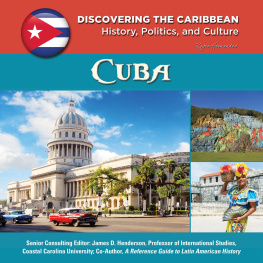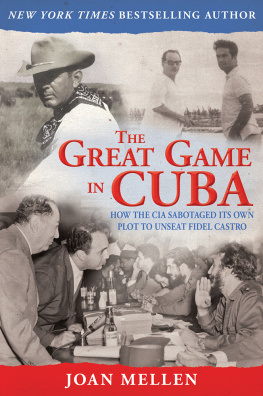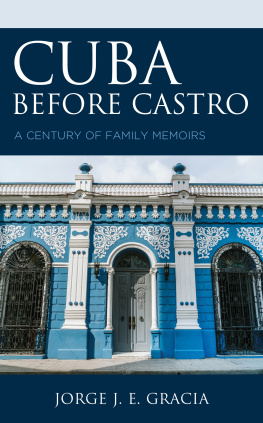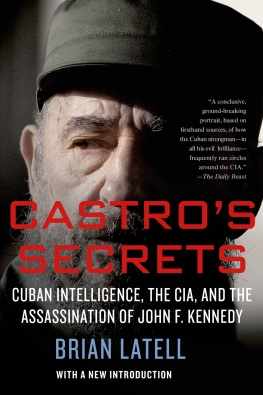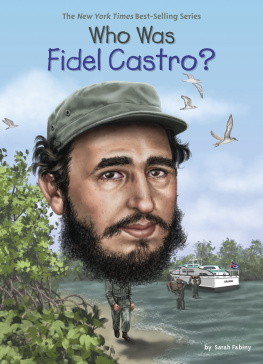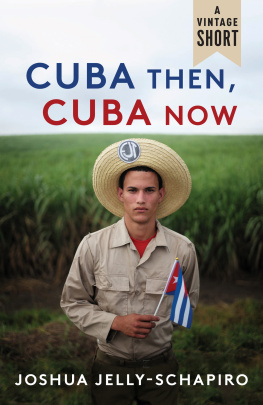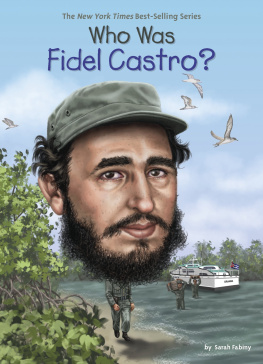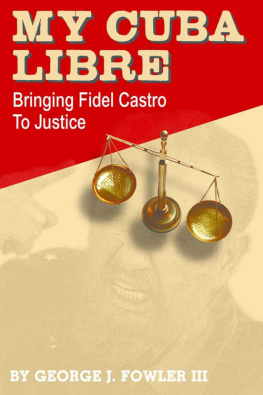CUBA
WHAT EVERYONE NEEDS TO KNOW
ALSO BY JULIA E. SWEIG
Inside the Cuban Revolution: Fidel Castro and
the Urban Underground
Friendly Fire: Losing Friends and Making
Enemies in the Anti-American Century
CUBA
WHAT EVERYONE NEEDS TO KNOW
JULIA E. SWEIG
Second Edition


Oxford University Press, Inc., publishes works that further
Oxford Universitys objective of excellence
in research, scholarship, and education.
Oxford New York
Auckland Cape Town Dar es Salaam Hong Kong Karachi
Kuala Lumpur Madrid Melbourne Mexico City Nairobi
New Delhi Shanghai Taipei Toronto
With offices in
Argentina Austria Brazil Chile Czech Republic France Greece
Guatemala Hungary Italy Japan Poland Portugal Singapore
South Korea Switzerland Thailand Turkey Ukraine Vietnam
Copyright 2009, 2012 by Julia E. Sweig
Published by Oxford University Press, Inc.
198 Madison Avenue, New York, New York 10016
www.oup.com
Oxford is a registered trademark of Oxford University Press
All rights reserved. No part of this publication may be reproduced, stored in a retrieval system, or transmitted, in any form or by any means, electronic, mechanical, photocopying, recording, or otherwise, without the prior permission of Oxford University Press.
The Library of Congress has cataloged the earlier edition as follows:
Sweig, Julia
Cuba : what everyone needs to know / Julia E. Sweig.
p. cm.
Includes bibliographical references and index.
ISBN 978-0-19-538379-9; 978-0-19-538380-5 (pbk.)
1. CubaPolitics and government19591990.
2. CubaHistoryRevolution, 1959.
3. CubaPolitics and government1990
4. CubaForeign relationsUnited States.
5. United StatesForeign relationsCuba.
I. Title
F1788.S955 2009
972.91064dc22 2009014819
What Everyone Needs to Know is a registered
trademark of Oxford University Press.
1 3 5 7 9 8 6 4 2
Printed in the United States of America
on acid-free paper
For Reed, for everything
CONTENTS
For this second edition, great thanks to my friend Jeffrey Goldberg, who graciously invited me to join him in Havana for his impromptu interviews with Fidel Castro in 2010. Michael Bustamante again lent his elegant editors touch and all around wisdom to the new material in the second edition. He is a first-class scholar, fine writer, creative thinker, and careful historian.
At the Council on Foreign Relations my thanks go to Dave Herrero and Samantha Fuchs for their superb research assistance and to Richard Haass, James Lindsay, Amy Baker, and Irina Faskianos. I have been very fortunate to have the generous support of the Ford Foundation while researching this book: in particular, I am deeply grateful to Mario Bronfman for his backing and for his friendship.
My thanks always to Saul Landau, devoted teacher and friend since my first trip to Cuba in 1984. I have made many friends and professional colleagues in Cuba since that first visit: thanks for your seriousness, scholarship, and friendship.
Dave McBride, my editor at Oxford University Press (OUP), had the idea for this book as part of OUPs What Everyone Needs to Know series. I am very pleased he invited me to participate and thank him for his guidance along the way.
February 2013
In Washington, D.C., August masquerades as a sleepy summer month. Beltway insiders habitually head out of town, trying to escape the mid-Atlantic swelter. Yet surprise conflicts, refugee crises, and budget showdowns always seem to up-end family plans to unplug. At least that is the running joke.
For as long as I can remember, rumors of Fidel Castros death have tended to surface in August as well. But in the summer of 2010, as if to preempt the news cycle, the aging Cuban revolutionary leader seized the stage of a national conference in Havana to make a six-minute speech warning of a potential nuclear crisis involving Iran. It was Fidels first public appearance since falling gravely ill in 2006. Save for a steady stream of published reflexiones or the occasional video clip, Fidels legendary ubiquity in Cuban private and public discourse had notably faded. On this occasion, Fidel once again grabbed the soapbox, attempting to alert Cubans and global public opinion to a looming catastrophe in the Middle East. The next week, Atlantic magazine journalist Jeffrey Goldberg published a cover story called The Coming War with Iran. I remember thinking that if Fidel saw the piece, he might take it as confirmation of his anxieties and validation of his seriousness as a student (if no longer protagonist) of international relations.
Later that month, I was not too surprised to receive a phone call from Ambassador Jorge Bolaos, Cubas lead diplomat in Washington. Though on vacation, I was planning to go to Cuba a few weeks later and assumed his call was about my trip. Instead, Bolaos got right to the point. Julia, he asked, can you put me in touch with Jeffrey Goldberg? Washington is a small town, so while perhaps comically presumptuous, it was not really a stretch for the ambassador to think that one writer who happens to be Jewish might be able to track down another prominent writer who recently had been named one of the Forward 50 Jews in the United States by the Jewish Daily Forward. As it turns out, Jeff and I have been friends for years.
Fidel can see you this weekend, Bolaos briskly told an also-vacationing Goldberg. Evidently, Castro wanted to compare notes about the brewing standoff over Irans nuclear program. Given Fidels notorious media savvy, I suspect he also viewed Jeff as a vehicle to send several messagesto Washington, Tel Aviv, Tehran, and to the left-leaning American and Latin American publics for whom his words still hold substantial cachet.
Three days later, Jeff and I sat in disbelief in the Miami airport waiting to board a sold-out flight to Havana. Because of the loosening of U.S. government restrictions on travel to Cuba, over the past several years Cuban-American families have filled more than 30 flights a week to the island, weighed down with everything from toiletries to flat screen TVs to multiple layers of clothing (thus avoiding steep taxes on excess luggage). More and more Cuban-Americans, as well as those who identify as diaspora Cubans, are traveling to their homeland, whether to visit, vacation, or, under the guise of remittances, invest in their families emerging small businesses. But most Americans who are not of Cuban descent are still banned from the 30-minute puddle jump, unless licensed by the Treasury Department.
During his tenure in power, the usually loquacious Fidel relished interviews with visiting reporters and editors. Over the years, he had met with hundreds, maybe even thousands, of Americansmembers of Congress, cabinet secretaries, Nobel Prize winners, religious leaders, intellectuals, Wall Street CEOs, even rock stars and fashion models. Yet ever since contracting a severe intestinal infection four summers earlier, the aging comandante had not spoken to one major American journalist. Although we understood Fidel wanted to talk about the Middle East, we had no idea what to expect.
Our first meeting took place in an office Fidel keeps at the Palacio de Convenciones, an imposing conference center. Fidels wife Dalia, son Tony, and personal doctor joined us for the nearly three-hour discussion, together with a translator and a small security detail. An avid and careful reader, Fidel showed Jeff the blue journal of notes he had taken on the
Next page


